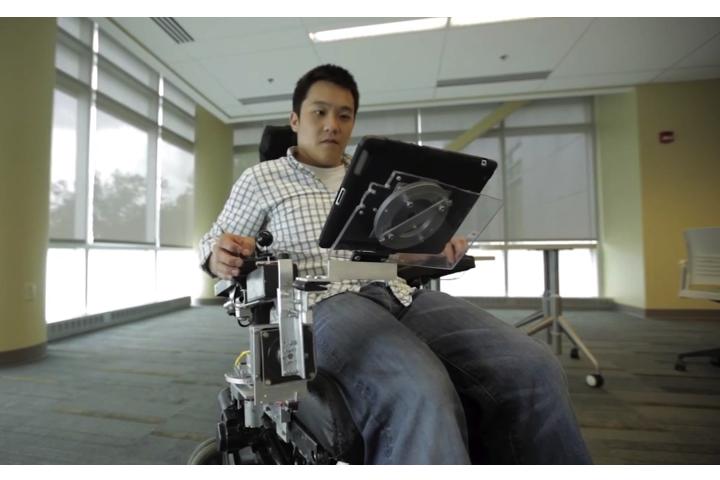
RoboDesk is the latest innovation to come from Purdue University, and it’s part handy tray, part motorized arm, and all really quite clever.
Developed to help people with disabilities who are in a wheelchair, the RoboDesk holds an iPad or another tablet in position, and then folds away when it’s no longer needed. The tablet is fitted to a custom mount, which is in turn attached to a mechanical arm, giving it the look of a miniature version of something you’d find on a production line in a factory.
Although it sounds quite simple, there are many things to consider when building an attachment for a wheelchair. For example, the RoboDesk needs to fold away neatly without much assistance; not hinder people getting in and out of the chair; and not make the chair any wider, so it’s not more awkward to move around.
You can see the RoboDesk in action below, where you’ll also spot a swiveling mount feature that lets a tablet be used in landscape or portrait mode. While holding a tablet seems to be the RoboDesk’s primary function, the arm can also be adapted to become a writing desk or a tray, and isn’t affected by the chair’s own functions, such as reclining or elevating. It doesn’t have to be restricted to a wheelchair either, as it could also be used on any fixed seat, beds in a hospital, or even a La-Z-Boy. (We’re guessing on that last one – but wouldn’t that be awesome?)
Purdue professor Brad Duerstock, who developed the RoboDesk and is a quadriplegic himself, says the goal of the project is to “foster independence and improve quality of life,” but adds he’s also interested in its abilities to help people with disabilities do more in the workplace and in higher education.
“I believe we are losing a lot of talented people who could make a difference if they’re given the tools and opportunities to succeed,” he said.
At the moment, the RoboDesk is still a work in progress, but Duerstock’s plan is to have it licensed and ready to for large scale manufacturing in the next three years.


